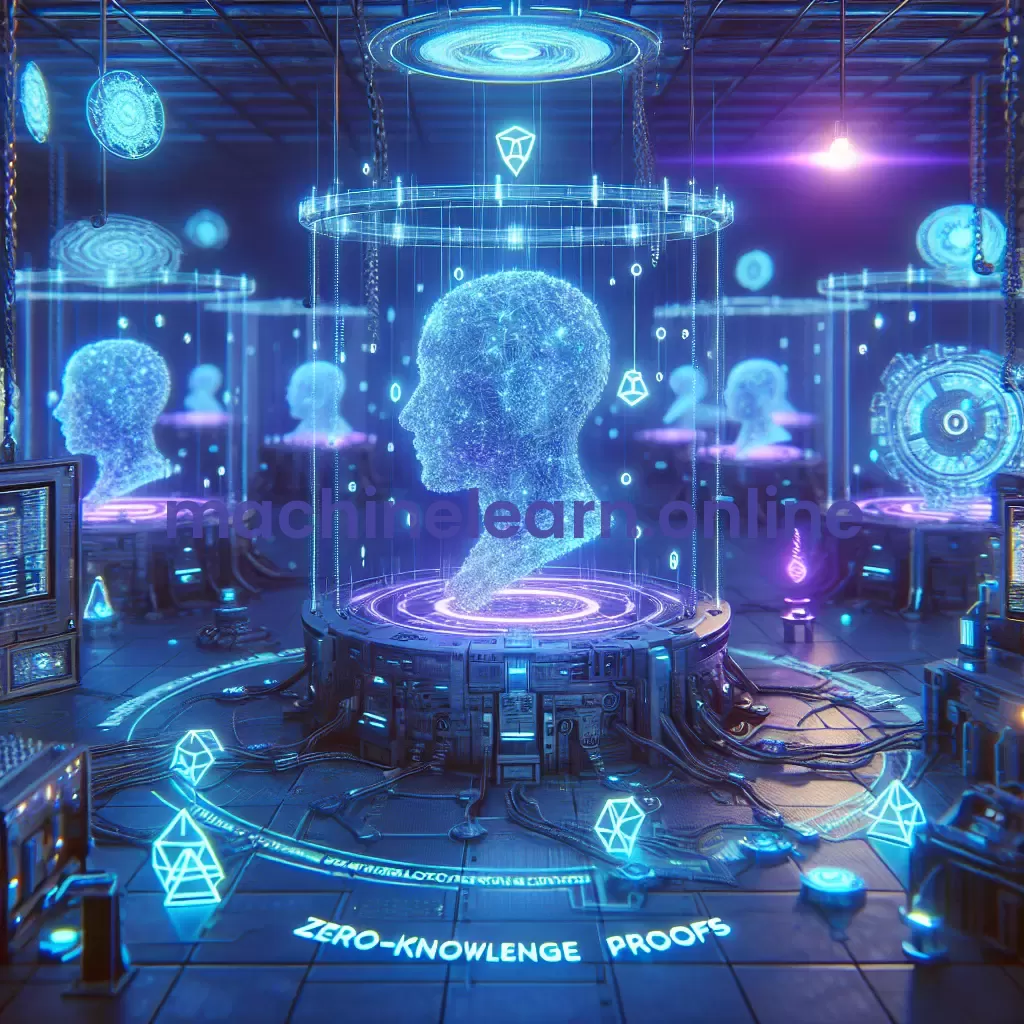On-Chain Verification of AI Models Using zk-SNARKs: Enhancing Trust in AI Marketplaces

Understanding On-Chain Verification of AI Models: The Role of zk-SNARKs
On-chain verification of AI models offers a solution to ensure that the models being deployed in various applications are trustworthy and have not been tampered with. At the heart of this verification process are zk-SNARKs, which stands for Zero-Knowledge Succinct Non-Interactive Arguments of Knowledge. This cryptographic method allows one party to prove to another that a computation has been carried out correctly without revealing the underlying data. This capability is essential for maintaining privacy while ensuring the integrity and accuracy of AI models.
- Understanding On-Chain Verification of AI Models: The Role of zk-SNARKs
- How zk-SNARKs Enhance Trust in AI Marketplaces Through On-Chain Verification
- The Future of AI Marketplaces: On-Chain Verification with zk-SNARKs
- Boosting Trust in AI: The Power of zk-SNARKs for On-Chain Model Verification
- On-Chain Verification Explained: zk-SNARKs and Their Impact on AI Models
- Enhancing AI Marketplace Integrity with On-Chain Verification and zk-SNARKs
- zk-SNARKs: The Key to Trustworthy AI Models in Decentralized Marketplaces
- The Role of zk-SNARKs in Decentralized Marketplaces
- The Intersection of AI and Blockchain: On-Chain Verification with zk-SNARKs
- Benefits of Using zk-SNARKs in AI-Driven Decentralized Marketplaces
By leveraging zk-SNARKs, developers can create a framework where AI models can be verified on-chain, meaning that all interactions with these models are recorded on a blockchain. This not only enhances security but also facilitates auditing and compliance in sectors where trust is critical, such as finance, healthcare, and autonomous systems. The ability to verify AI models on-chain ensures that stakeholders can confirm the authenticity of the models used, thus reducing the risk of fraud and increasing overall trust in AI-driven solutions.
How zk-SNARKs Enhance Trust in AI Marketplaces Through On-Chain Verification
The intersection of AI and blockchain technology has given rise to AI marketplaces where various models can be bought, sold, and utilized. In these marketplaces, trust is a significant factor that influences user engagement and transactions. zk-SNARKs play a crucial role in enhancing this trust by providing a mechanism for on-chain verification of the AI models offered. When an AI model is uploaded to a marketplace, zk-SNARKs can verify its performance and ensure that it meets the claimed specifications without exposing sensitive information about the model or the data it was trained on.
For instance, a developer can prove that their model achieves a certain level of accuracy on a benchmark dataset without revealing the dataset itself. This not only protects intellectual property but also instills confidence in potential buyers. Buyers can be assured that they are purchasing a model that has been verified for its claims, thus reducing the likelihood of investing in ineffective or fraudulent solutions. Additionally, on-chain verification through zk-SNARKs allows for a transparent audit trail, enabling stakeholders to verify the history and integrity of the models, further enhancing trust in the marketplace.
| Feature | zk-SNARKs Benefits | Impact on AI Marketplaces |
|---|---|---|
| Privacy | Allows verification without revealing sensitive data | Protects intellectual property of models |
| Security | Ensures that computations are performed correctly | Reduces risk of fraud and enhances user confidence |
| Efficiency | Succinct proofs save time and resources | Facilitates faster transactions and model assessments |
| Transparency | Provides an immutable record of model performance | Enables clear auditing and compliance checks |
The Future of AI Marketplaces: On-Chain Verification with zk-SNARKs
As the integration of AI and blockchain technology continues to mature, the future of AI marketplaces will likely see a greater emphasis on on-chain verification using zk-SNARKs. This transition will not only enhance the security and reliability of AI models but will also pave the way for new business models and collaborative frameworks. We can expect to see the emergence of decentralized AI marketplaces where developers, data scientists, and businesses can interact in a trustless environment.
Furthermore, as regulatory scrutiny increases in various sectors, the need for compliance through verifiable systems will become critical. zk-SNARKs will enable AI developers to demonstrate compliance with industry standards without compromising the privacy of their models. This capability will be essential in building robust AI applications that can operate within legal frameworks while maintaining user trust and confidentiality.
The combination of on-chain verification and zk-SNARKs represents a significant advancement in the way AI models are developed, shared, and utilized. By fostering trust through rigorous verification processes, the future of AI marketplaces can become more transparent, efficient, and secure, ultimately leading to a more innovative and accountable AI ecosystem.
Boosting Trust in AI: The Power of zk-SNARKs for On-Chain Model Verification
As artificial intelligence (AI) continues to proliferate across various sectors, the need for transparency and trust in AI models has never been more critical. One of the most promising solutions to address these concerns is the integration of zk-SNARKs (Zero-Knowledge Succinct Non-Interactive Arguments of Knowledge) for on-chain model verification. This advanced cryptographic technology enables the validation of AI models in a manner that preserves privacy while ensuring their integrity and correctness.
zk-SNARKs allow parties to prove the validity of computations without revealing the underlying data or the details of the computation itself. This feature is particularly advantageous for AI models, which often require access to sensitive data. By utilizing zk-SNARKs, AI developers can provide proof that their models are functioning correctly and ethically without exposing proprietary algorithms or user data. This capability boosts trust from stakeholders, including consumers, regulators, and businesses, fostering greater adoption of AI technologies.
On-Chain Verification Explained: zk-SNARKs and Their Impact on AI Models
On-chain verification refers to the process of validating transactions or computations directly on a blockchain. This approach enhances security and transparency, making it an ideal method for verifying AI models. By employing zk-SNARKs within this framework, developers can create a system where AI models can be audited and verified in real-time, ensuring they adhere to predefined standards and ethical guidelines.
The impact of on-chain verification using zk-SNARKs on AI models is profound. It enables a trustless environment where users can independently verify the performance and integrity of AI systems. For instance, if an AI model is used for healthcare diagnostics, zk-SNARKs can confirm the model’s accuracy without exposing patient data or the intricacies of the model itself. This not only enhances user trust but also accelerates regulatory approval processes, as verifiable evidence of the model’s efficacy can be provided through the blockchain.
| Feature | zk-SNARKs | Traditional Verification |
|---|---|---|
| Data Privacy | High – Allows for proof without revealing data | Low – Often requires data exposure |
| Verification Speed | Fast – Succinct proofs lead to quick validation | Slower – Detailed audits can take significant time |
| Cost of Verification | Low – Minimal resource use for proof generation | High – Resource-intensive audits |
| Trust Level | High – Trustless and decentralized verification | Moderate – Dependent on trusted third parties |
Enhancing AI Marketplace Integrity with On-Chain Verification and zk-SNARKs
The integration of zk-SNARKs for on-chain verification is not just a technological advancement; it represents a paradigm shift in how AI models are deployed and trusted in marketplaces. As AI-driven products become more prevalent, the integrity of these offerings is paramount. Consumers need assurance that the AI tools they are using are reliable, ethically developed, and free from bias.
By leveraging zk-SNARKs for on-chain verification, AI marketplaces can foster an ecosystem where all models are verified against established benchmarks. This verification process builds consumer confidence, as users can access verifiable proof of performance and compliance before making purchasing decisions. Moreover, it protects AI developers by providing a framework for them to demonstrate their model’s capabilities without compromising their intellectual property.
The combination of zk-SNARKs and on-chain verification presents a robust solution to the challenges of trust and integrity in AI. As the technology continues to evolve, it will undoubtedly play a pivotal role in shaping the future of AI applications across various industries, ensuring that they are not only effective but also trustworthy and transparent.
zk-SNARKs: The Key to Trustworthy AI Models in Decentralized Marketplaces
As the landscape of technology evolves, the intersection of artificial intelligence (AI) and blockchain is becoming increasingly significant, particularly in decentralized marketplaces. One of the pivotal technologies facilitating this integration is zk-SNARKs (Zero-Knowledge Succinct Non-Interactive Arguments of Knowledge). These cryptographic proofs allow for the verification of information without revealing the underlying data, ensuring both privacy and integrity. This capability is essential in building trustworthy AI models that operate within decentralized systems.
In decentralized marketplaces, trust is a fundamental requirement for participants to engage confidently in transactions. Traditional models often rely on central authorities to verify transactions, which can lead to inefficiencies and vulnerabilities. However, by utilizing zk-SNARKs, AI models can provide on-chain verification of data while maintaining user privacy. This not only enhances trust among users but also allows for a more seamless and efficient marketplace where AI algorithms can operate transparently and securely.
The Role of zk-SNARKs in Decentralized Marketplaces
zk-SNARKs enable a new paradigm for AI models in decentralized marketplaces by ensuring that sensitive data remains confidential while still providing necessary verification. For instance, when an AI model processes a transaction or assesses the credibility of a seller, it can generate a zk-SNARK proof that confirms the validity of the data used without disclosing the data itself. This is particularly valuable in scenarios where data privacy is paramount, such as in healthcare or finance.
Moreover, zk-SNARKs contribute to the scalability of blockchain technology. Since these proofs are succinct (small in size) and quick to verify, they enable the processing of a large number of transactions without overloading the network. This aspect is crucial for AI models that may require real-time data processing and quick decision-making in dynamic marketplaces.
The Intersection of AI and Blockchain: On-Chain Verification with zk-SNARKs
The convergence of AI and blockchain technology opens up new avenues for innovation. On-chain verification using zk-SNARKs allows AI models to operate in a decentralized manner while ensuring accountability and traceability. For example, in a decentralized finance (DeFi) platform, users can leverage AI algorithms to optimize their investment strategies. By utilizing zk-SNARKs, these algorithms can verify the legitimacy of the investment data sourced from various decentralized applications (dApps) while keeping user-specific data private.
This intersection presents a unique opportunity for developers to create AI models that are not only efficient but also aligned with the principles of decentralization. By employing zk-SNARKs, developers can ensure that these models are resistant to manipulation and fraud, thereby fostering a more secure environment for all market participants.
Benefits of Using zk-SNARKs in AI-Driven Decentralized Marketplaces
| Benefit | Description | Impact |
|---|---|---|
| Privacy Preservation | zk-SNARKs allow for the verification of data without revealing the actual data. | Enhances user trust and confidentiality. |
| Scalability | Proofs are small and quick to verify, allowing for efficient transaction processing. | Supports high throughput in decentralized networks. |
| Fraud Prevention | Ensures data integrity by allowing only valid transactions to be verified. | Reduces the risk of manipulation and increases market reliability. |
| Decentralized Control | Empowers users to verify transactions independently without relying on central authorities. | Enhances autonomy and democratizes access to AI-driven services. |
zk-SNARKs play a crucial role in bridging the gap between AI and blockchain technology in decentralized marketplaces. By enabling on-chain verification while preserving privacy, they not only enhance trust and security but also facilitate the development of innovative AI models that can thrive in decentralized environments. As this technology continues to evolve, we can expect to see more robust applications that harness the power of both AI and blockchain, ultimately reshaping how marketplaces operate in the digital age.
On-chain verification of AI models refers to the process of validating and confirming the integrity and performance of AI models directly on a blockchain. This technique ensures that the models have not been tampered with and that they can be trusted by users in AI marketplaces.
zk-SNARKs (Zero-Knowledge Succinct Non-Interactive Arguments of Knowledge) enhance the verification process by allowing one party to prove to another that a statement is true without revealing any additional information. This is particularly useful for AI models, as it enables the verification of their performance metrics while keeping proprietary data confidential.
The benefits of using zk-SNARKs in AI marketplaces include improved trust among users, enhanced privacy for model creators, reduced computational overhead for verification, and the ability to verify complex models without exposing sensitive data. This fosters a more secure and reliable environment for AI transactions.
Yes, on-chain verification can significantly reduce fraud in AI marketplaces by providing a transparent and immutable record of all AI model validations. This ensures that users can trust the AI models they are purchasing or using, as the verification process is publicly accessible and cannot be altered.
While on-chain verification using zk-SNARKs offers many advantages, there are limitations such as the complexity of implementation, potential scalability issues, and the need for sufficient computational resources. Additionally, understanding zk-SNARKs may require a certain level of technical expertise, which could limit adoption among less technical users.





